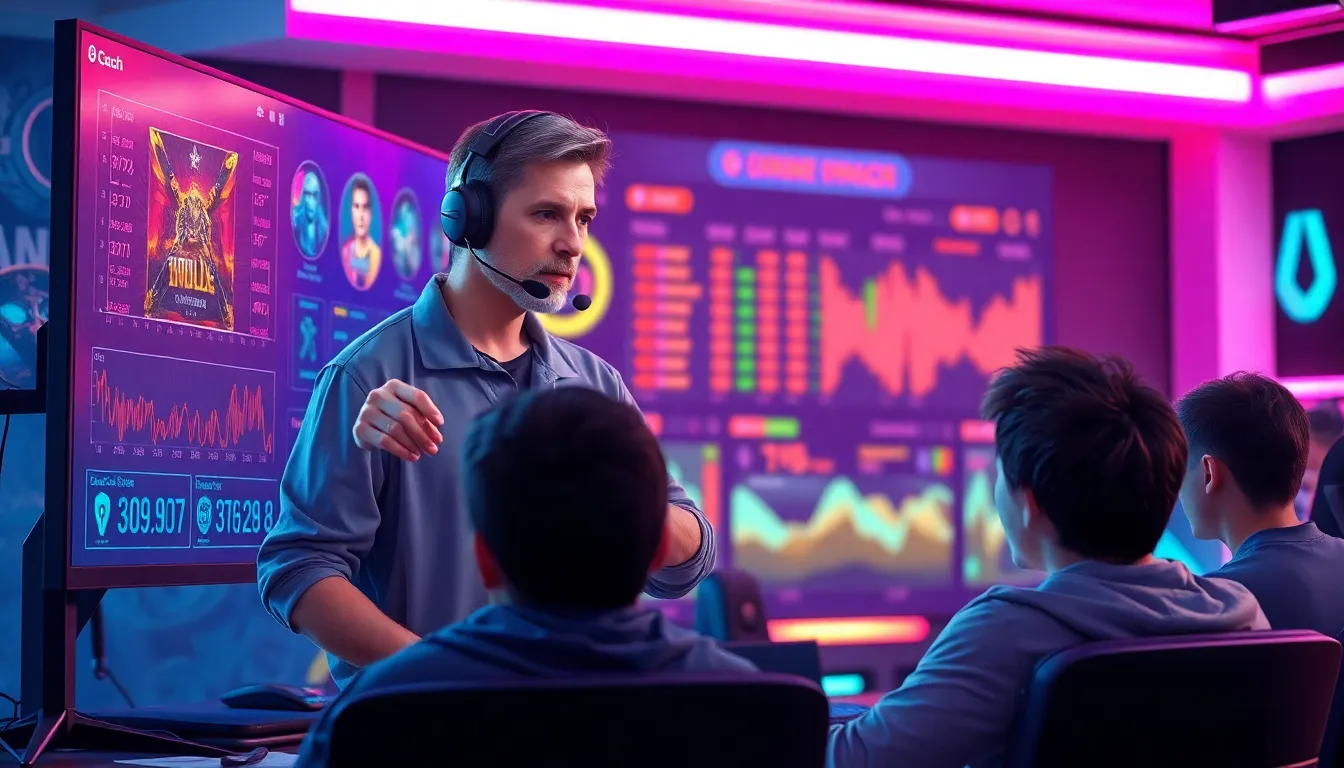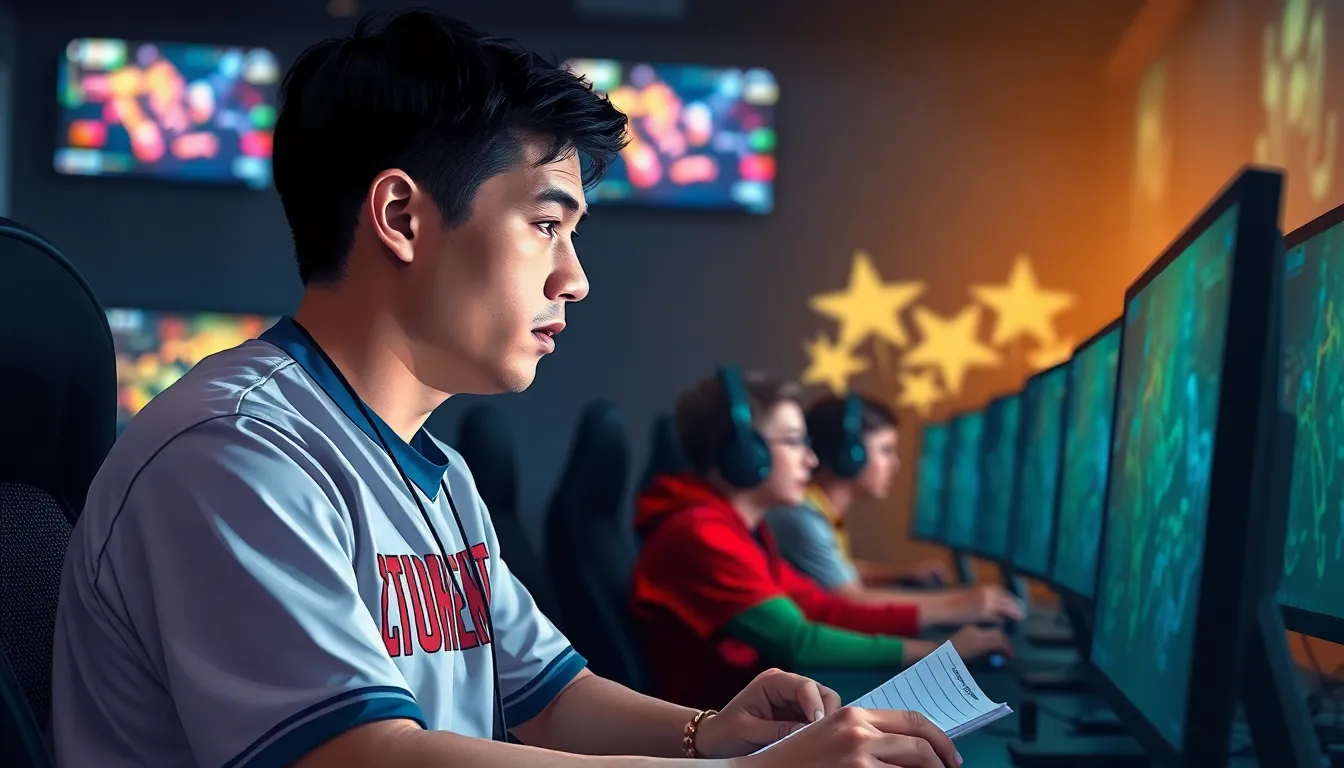In the fast-paced world of eSports, having a skilled coach can be the secret ingredient that transforms a good player into a great one. Think of an eSports coach as a game-changing power-up. They bring strategy, teamwork, and a sprinkle of motivation to the virtual battlefield, helping players level up their skills and performance.
e sports coach
An eSports coach serves as a vital component of any competitive gaming team. Their primary responsibility involves analyzing gameplay and developing strategies that enhance team performance. They guide players through intricate game mechanics, ensuring each member understands their role within the team structure.
Coaches focus on improving individual skills by implementing tailored training sessions. They often use video analysis to pinpoint weaknesses and highlight areas for improvement. Feedback provided during these sessions helps players refine their techniques and decision-making processes during matches.
In addition to gameplay analysis, eSports coaches foster teamwork and communication among players. They create an environment where collaboration thrives, enabling teams to work cohesively under pressure. Regular team-building exercises lead to stronger relationships and better in-game synergy.
Motivation plays a crucial role in a coach’s responsibilities. He or she inspires players to stay committed and focused, especially during challenging tournaments. Holding motivational meetings before competitions boosts team morale and sets a positive tone.
Furthermore, eSports coaches keep abreast of the latest trends in the gaming industry. Staying informed about updates, strategies, and meta changes ensures teams remain competitive. Knowledge about opponents, including their strategies and weaknesses, further equips coaches to prepare their teams effectively.
Overall, eSports coaches are essential for elevating a team’s performance. Their multifaceted approach combines strategy, skill development, teamwork, and motivation, creating a solid foundation for success in the competitive gaming landscape.
The Role of an E Sports Coach

An eSports coach plays a critical role in shaping a team’s success through focused training and strategic insights. They elevate player performance and cultivate team dynamics.
Training and Development
Coaches design personalized training sessions targeting individual players’ weaknesses. Tailored exercises replace generic approaches, creating efficient paths for improvement. Utilizing video analysis helps coaches highlight specific areas for development. They also incorporate performance metrics to track progress over time. Daily drills incorporate both mechanical skill and game sense. Players receive feedback that promotes growth and continuous learning. The environment remains positive, and patience is essential to progression.
Strategy and Analysis
Strategy forms the backbone of a coach’s work. Coaches analyze opponents’ gameplay to exploit weaknesses and develop counter-strategies. Creating in-depth game plans fosters adaptability during matches. Coordination becomes crucial as coaches ensure that team members understand their roles and responsibilities within the game. Frequent reviews of recorded matches promote reflection and improvement, allowing teams to learn from mistakes. Coaches also emphasize the importance of adjusting strategies based on the evolving gaming landscape, ensuring that teams stay ahead of competitors.
Skills Required for an E Sports Coach
Effective communication forms the backbone of an eSports coach’s relationship with their team. Specific messages must be conveyed clearly to enhance understanding of strategies, teamwork, and roles. Coaches foster open dialogues, encouraging players to voice concerns and suggestions, promoting a growth-oriented environment.
Communication Skills
Strong communication skills enhance collaboration within the team. Coaches articulate strategies clearly, ensuring every member understands their responsibilities during a match. Additionally, listening is crucial; coaches must recognize player concerns to address them effectively. Feedback provided by coaches should be constructive and timely, enabling players to make real-time adjustments. With effective communication, teams can build trust and camaraderie, ultimately increasing performance under pressure.
Game Knowledge
In-depth game knowledge empowers coaches to analyze gameplay effectively. Understanding game mechanics, character abilities, and map layouts allows coaches to devise effective strategies. They must stay updated on current meta trends and competitor tactics to stay competitive. Additionally, familiarity with various play styles helps coaches tailor training sessions. Knowledgeable coaches can dissect an opponent’s gameplay and integrate these insights into their team’s strategies. Continuous learning ensures coaches maintain relevance in rapidly changing environments, benefiting their teams significantly.
The Benefits of Having an E Sports Coach
Having an eSports coach significantly enhances player performance by providing critical insights and personalized training. Coaches analyze gameplay meticulously, identifying areas for improvement that individual players might overlook. They focus on skill enhancement and tactical knowledge, ensuring that each player develops effectively within their role.
Team communication improves under a coach’s guidance, fostering a collaborative environment where strategies are understood and executed. Players gain a clearer understanding of their responsibilities during matches, leading to better coordination and synergy. Coaches also implement regular feedback sessions, which help players recognize their strengths and weaknesses.
Motivation remains a key benefit of hiring a coach. Players often face emotional and mental challenges during competitive gaming, and a coach’s support aids in maintaining focus and determination. The presence of a coach inspires higher levels of commitment, particularly during intense tournaments.
In-depth knowledge of the game allows coaches to stay ahead of trends and opponents. By keeping up with evolving strategies, they equip players with the tools to adapt to new challenges. This proactive approach to learning ensures teams remain competitive in the fast-paced gaming landscape.
Analyzing opponents’ gameplay also forms a crucial aspect of a coach’s responsibilities. Coaches create strategies designed to exploit weaknesses, giving their teams an edge during competitions. Understanding the meta can lead to significant tactical advantages, enhancing overall team performance.
Lastly, developing strong relationships based on trust and communication is essential. A coach encourages players to express their thoughts and concerns, creating an open dialogue that leads to better collaboration. Establishing this rapport enhances team dynamics, ultimately resulting in improved outcomes in competitive environments.
Conclusion
The impact of an eSports coach on a team’s success is undeniable. By blending strategy, skill development, and motivation, they create a robust framework for players to thrive. Their ability to analyze gameplay and foster communication enhances team dynamics, leading to improved performance in competitive scenarios.
As the eSports landscape continues to evolve, the role of coaches becomes increasingly vital. They not only adapt strategies to counter opponents but also cultivate a positive environment where players can grow and excel. Investing in a skilled eSports coach can be the difference between a good team and a championship-winning one.

